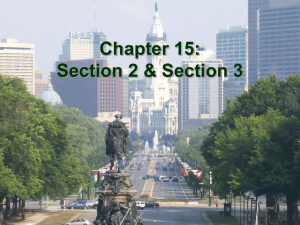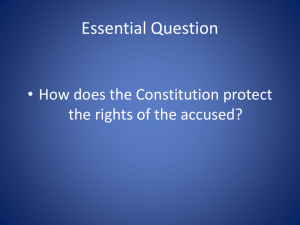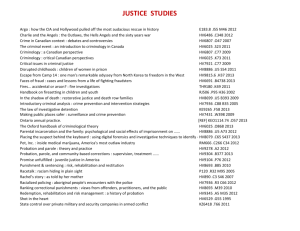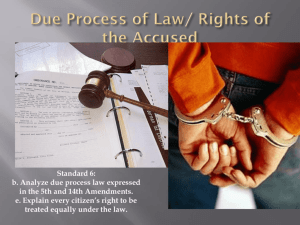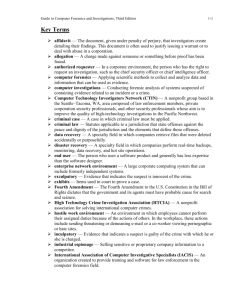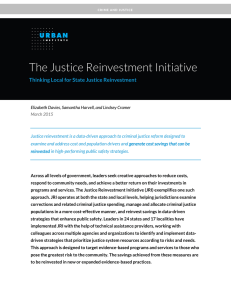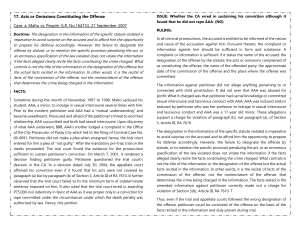Name: Date: Mrs. Belesis Criminal Justice Multiple Choice for
advertisement
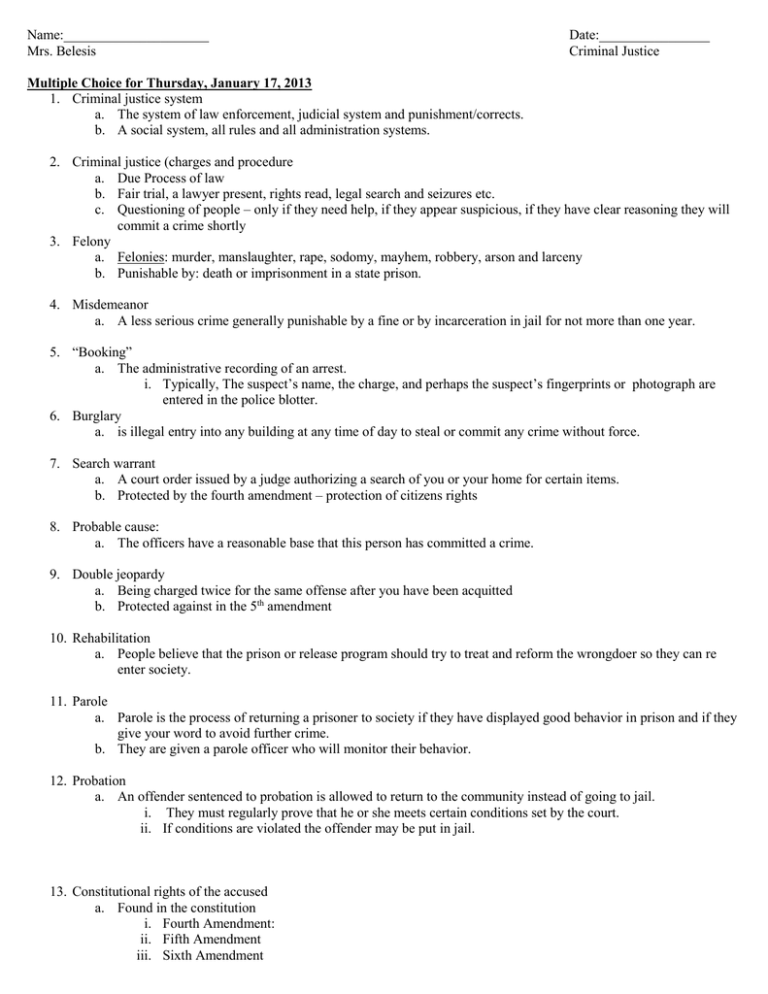
Name:_____________________ Mrs. Belesis Date:________________ Criminal Justice Multiple Choice for Thursday, January 17, 2013 1. Criminal justice system a. The system of law enforcement, judicial system and punishment/corrects. b. A social system, all rules and all administration systems. 2. Criminal justice (charges and procedure a. Due Process of law b. Fair trial, a lawyer present, rights read, legal search and seizures etc. c. Questioning of people – only if they need help, if they appear suspicious, if they have clear reasoning they will commit a crime shortly 3. Felony a. Felonies: murder, manslaughter, rape, sodomy, mayhem, robbery, arson and larceny b. Punishable by: death or imprisonment in a state prison. 4. Misdemeanor a. A less serious crime generally punishable by a fine or by incarceration in jail for not more than one year. 5. “Booking” a. The administrative recording of an arrest. i. Typically, The suspect’s name, the charge, and perhaps the suspect’s fingerprints or photograph are entered in the police blotter. 6. Burglary a. is illegal entry into any building at any time of day to steal or commit any crime without force. 7. Search warrant a. A court order issued by a judge authorizing a search of you or your home for certain items. b. Protected by the fourth amendment – protection of citizens rights 8. Probable cause: a. The officers have a reasonable base that this person has committed a crime. 9. Double jeopardy a. Being charged twice for the same offense after you have been acquitted b. Protected against in the 5th amendment 10. Rehabilitation a. People believe that the prison or release program should try to treat and reform the wrongdoer so they can re enter society. 11. Parole a. Parole is the process of returning a prisoner to society if they have displayed good behavior in prison and if they give your word to avoid further crime. b. They are given a parole officer who will monitor their behavior. 12. Probation a. An offender sentenced to probation is allowed to return to the community instead of going to jail. i. They must regularly prove that he or she meets certain conditions set by the court. ii. If conditions are violated the offender may be put in jail. 13. Constitutional rights of the accused a. Found in the constitution i. Fourth Amendment: ii. Fifth Amendment iii. Sixth Amendment iv. Seventh Amendment v. Eighth Amendment 14. Habeas corpus a. writ requiring a person to be brought before a judge or court 15. Criminology a. the scientific study of the causes of crime and rehabilitation and punishment of offenders. 16. Date Rape a. Rarely reported because the victim feels it was their fault or that it wasn’t “legitimate” rape 17. Embezzlement a. When people take property (theft) they have been entrusted with (usually large amounts) 18. Tort a. Breach of some obligation causing harm or injury i. Negligence, libel etc. b. Usually a civil crime 19. Alibi a. Used by an accused person explaining that they were elsewhere at the time an alleged offense was committed. 20. Jail versus prison a. Jail is for sentences that are one year or less and for misdemeanors. b. Prisons are for more serious offences that are punishable by one or more years. 21. Right to speedy and public trial a. Sixth Amendment- Guaranteed to the accused. 22. Exclusionary Rule a. a rule that forbids the introduction of illegally obtained evidence in a criminal trial. 23. Criminal charges a. Arraignments: Being brought before a judge and told what laws you have broken 24. Due process a. The requirement that all legal procedures of law enforcement, the courts are fair and equal. 25. Grand jury a. A panel of people who decide whether or not there is enough evidence to bring the case to trial. 26. Testimony a. A statement or declaration of a person under oath. 27. Plea bargaining a. Plea bargain gives the prosecutor the ability to accept a guilty plea on a lesser charge than that was originally brought. 28. Civil law a. Regulates relations between individuals b. The outcome determines whether or not they will pay money to the prosecution 29. Expert witness a. Can be called in during a trial to explain the meaning of certain evidence. 30. Role of defense attorney i. They must defend the accused by showing that the government does not have enough evidence to convict the defendant. ii. They hold the burden of proof 31. Role of jury a. Determine whether or not the defendant is guilty or innocent 32. Miranda warning a. You must be advised of your constitutional rights. i. Given a lawyer 33. NJ v. TLO a. Stated that school officials can search students if they have reasonable suspicion 34. Roles of Police officers a. Preventing crimes by driving around neighborhoods and being visible. 35. Actus reus a. to intentional criminal conduct, or criminally negligent (reckless) action 36. mens rea a. Criminal intent; a guilty state of mind. 37. Lex Talionis a. The law of retaliation 38. Computer crimes a. Data Diddling- modifying data for fun and profit; b. Trojan Horse- Computer viruses that appear to be regular programs but are actual hacking programs. c. Superzapping- Using software to bypass security in order to hack into someone’s information

